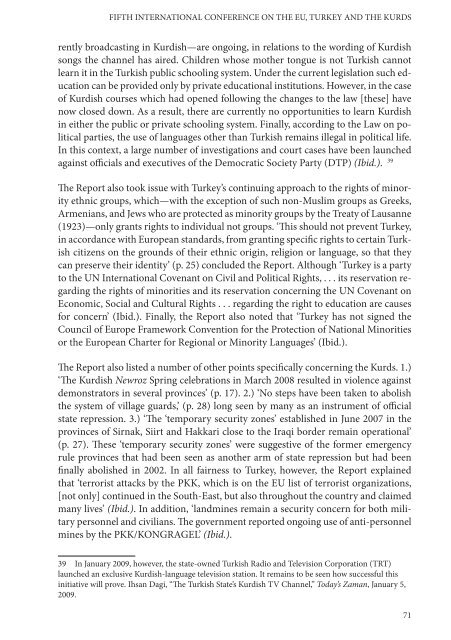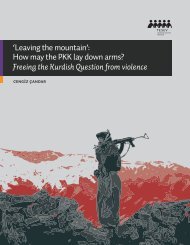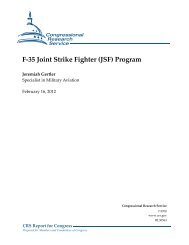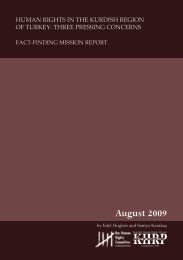FIFTH INTERNATIONAL CONFERENCE ON THE EU TURKEY AND THE KURDS
fifth international conference on the eu, turkey and the kurds
fifth international conference on the eu, turkey and the kurds
Create successful ePaper yourself
Turn your PDF publications into a flip-book with our unique Google optimized e-Paper software.
<strong>FIFTH</strong> <strong>INTERNATI<strong>ON</strong>AL</strong> <strong>C<strong>ON</strong>FERENCE</strong> <strong>ON</strong> <strong>THE</strong> <strong>EU</strong>, <strong>TURKEY</strong> <strong>AND</strong> <strong>THE</strong> <strong>KURDS</strong><br />
rently broadcasting in Kurdish—are ongoing, in relations to the wording of Kurdish<br />
songs the channel has aired. Children whose mother tongue is not Turkish cannot<br />
learn it in the Turkish public schooling system. Under the current legislation such education<br />
can be provided only by private educational institutions. However, in the case<br />
of Kurdish courses which had opened following the changes to the law [these] have<br />
now closed down. As a result, there are currently no opportunities to learn Kurdish<br />
in either the public or private schooling system. Finally, according to the Law on political<br />
parties, the use of languages other than Turkish remains illegal in political life.<br />
In this context, a large number of investigations and court cases have been launched<br />
against officials and executives of the Democratic Society Party (DTP) (Ibid.). 39<br />
The Report also took issue with Turkey’s continuing approach to the rights of minority<br />
ethnic groups, which—with the exception of such non-Muslim groups as Greeks,<br />
Armenians, and Jews who are protected as minority groups by the Treaty of Lausanne<br />
(1923)—only grants rights to individual not groups. ‘This should not prevent Turkey,<br />
in accordance with European standards, from granting specific rights to certain Turkish<br />
citizens on the grounds of their ethnic origin, religion or language, so that they<br />
can preserve their identity’ (p. 25) concluded the Report. Although ‘Turkey is a party<br />
to the UN International Covenant on Civil and Political Rights, . . . its reservation regarding<br />
the rights of minorities and its reservation concerning the UN Covenant on<br />
Economic, Social and Cultural Rights . . . regarding the right to education are causes<br />
for concern’ (Ibid.). Finally, the Report also noted that ‘Turkey has not signed the<br />
Council of Europe Framework Convention for the Protection of National Minorities<br />
or the European Charter for Regional or Minority Languages’ (Ibid.).<br />
The Report also listed a number of other points specifically concerning the Kurds. 1.)<br />
‘The Kurdish Newroz Spring celebrations in March 2008 resulted in violence against<br />
demonstrators in several provinces’ (p. 17). 2.) ‘No steps have been taken to abolish<br />
the system of village guards,’ (p. 28) long seen by many as an instrument of official<br />
state repression. 3.) ‘The ‘temporary security zones’ established in June 2007 in the<br />
provinces of Sirnak, Siirt and Hakkari close to the Iraqi border remain operational’<br />
(p. 27). These ‘temporary security zones’ were suggestive of the former emergency<br />
rule provinces that had been seen as another arm of state repression but had been<br />
finally abolished in 2002. In all fairness to Turkey, however, the Report explained<br />
that ‘terrorist attacks by the PKK, which is on the <strong>EU</strong> list of terrorist organizations,<br />
[not only] continued in the South-East, but also throughout the country and claimed<br />
many lives’ (Ibid.). In addition, ‘landmines remain a security concern for both military<br />
personnel and civilians. The government reported ongoing use of anti-personnel<br />
mines by the PKK/K<strong>ON</strong>GRAGEL’ (Ibid.).<br />
39 In January 2009, however, the state-owned Turkish Radio and Television Corporation (TRT)<br />
launched an exclusive Kurdish-language television station. It remains to be seen how successful this<br />
initiative will prove. Ihsan Dagi, “The Turkish State’s Kurdish TV Channel,” Today’s Zaman, January 5,<br />
2009.<br />
71





